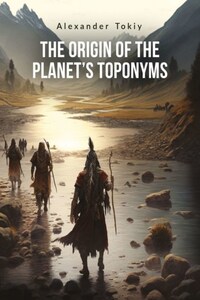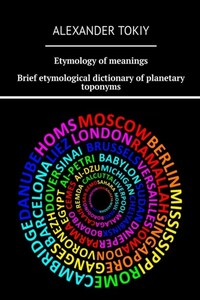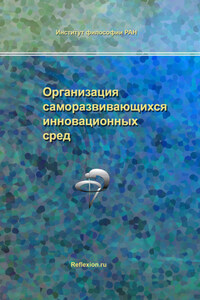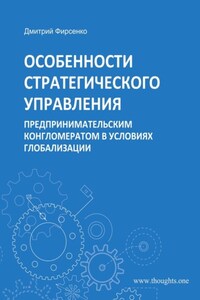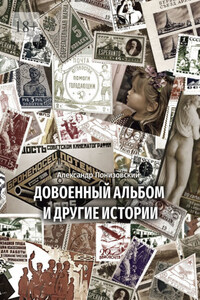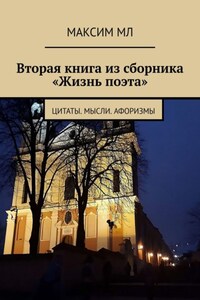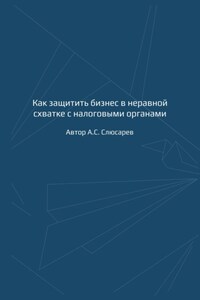Translator Polina Mozzhukhina
Editor Olga Vasilenko
Cover designer Maria Vedishcheva
© Alexander Tokiy, 2023
© Polina Mozzhukhina, translation, 2023
© Maria Vedishcheva, cover design, 2023
ISBN 978-5-0060-7673-0
Created with Ridero smart publishing system
Dear friends,
Since your childhood, studying geography, you probably have noticed that many geographical denominations are very similar to each other.For example, the rivers or the lakes. There are the Miass, the Masa, and the Lake Misiash in the Urals; the Moscow, the Msta and the Mius in the center of Russia; the Meuse, the Moselle and the Thames in Europe; the Mosul and the Homs in the Middle East; the Mississippi and the Missouri in the USA.In another case, the denominations of rivers are similar to the “d” and “n” sounds. For example, the Don, the Danube, the Dnieper, the Dniester, the Jordan, the Medina, the Aberdeen and others. However, these are only the most famous rivers.The names of the mountains have their own peculiarity: Ai-Petri, Ai-Foka, Aigir, Aikuaivenchorr, Aino, Aizu, Iowa, Idaho, Altai and Sinai. Therefore, there are many of such repetitive, similardenominations. How did such a similarity develop? Is it randomness or a regularity? Scientists often try to explain the origin and meaning of toponyms through the local languages of peoples who live in these areas now or lived in the past. This is a deeply wrong approach. Toponyms appeared much earlier, in very ancient times.Thousands and thousands of years ago, our ancestors marked the habitat depending on the features of the landscape, and marked it in that ancient language, which has changed significantly over thousands of years of its developing. Geographical objects were given names strictly corresponding to these very features, laying in them a semantic meaning explaining what kind of object it is. Then, migrating and settling new territories, they marked the new area in the same way, assigning names to new geographical objects in the established semantic paradigm.
Is it difficult for an ordinary reader to understand the intended meanings, which were put into different groups of toponyms? Not at all. At first glance, someone may be afraid of intricate scientific terminology, obscure scientific words, and confusing logical conclusions. Donot be afraid! The Russian language, truthful and faithful to the nature, will help you. The Russian language is the science that we all study equally from infancy, where we are all equal, regardless of our education, degrees or titles. On the contrary, improving the form of the language, placing it in the rigid Procrustean bed of grammar, sometimes distorted the language to such an extent that its semantic conception was lost, and “obscuring” the connection between form and semantic meaning or content. Scientists call this process deetymologization, which often misleads us. Once, a few years ago, on a direct line, Russian President Vladimir Putin was asked a question: why korova’s (cow’s) meat is called “govyadina” (“beef”). The President forwarded it to the Minister of agriculture A. Gordeyev, but the Minister honestly admitted that he did not know. It was partly sad. Recently, many people have been talking about various types of “spiritual bonds”, although it is obvious to me that such bond is Russian language, “great and powerful”, as I. S. Turgenev said. Nevertheless, we hardly hear our own language. Improving the form of language, we forget about its content, about its meanings.The incident that had happened on that television program made such a strong impression on me that, not being a scientist and not having great talents as a non-fiction writer, I ventured to write a small book “Etymology of Meanings”. I sent it to the country’s leaders, scientists and many other famous people. In addition, I sent English version to foreign universities, heads of state and royalty. There were many positive and even enthusiastic responses, but the book did not receive wide public recognition. Nothing surprising.It is difficult to change the ideas that have developed over many centuries. Moreover, my ideas about the origin of words, which during their history have changed and lost their original meanings, in many ways seem very doubtful to the modern reader. Moreover, official science treated my conclusions very cautiously. Therefore, to be more convincing and I decided to write a book only about the toponyms of the planet.Toponyms are an amazing legacy, which was left to us by ancient ancestors. This legacy is visible, clear and, as my first editor Vyacheslav Lyutov said, rough to the touch. Toponyms are the key to understanding the development of language, the keepers of ancient meanings that are difficult to dispute. The patterns of language development began with these names, with the first principles that I discovered throughout my life in the course of independent searches and which I will try to share with readers very briefly and in the simplest and most accessible form. I hope you will be interested.
